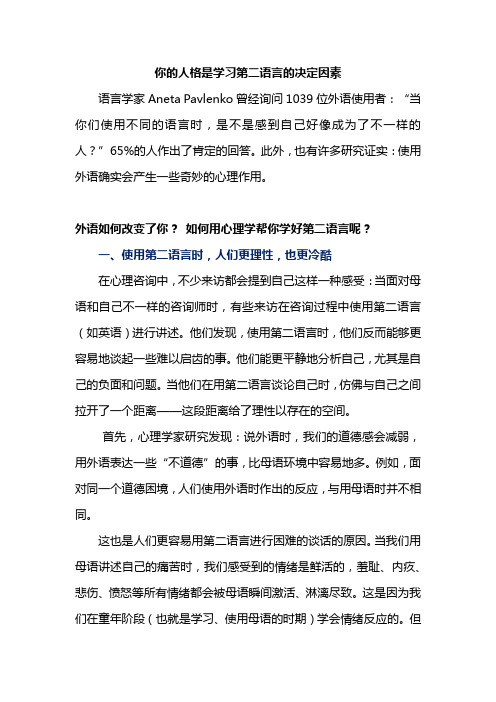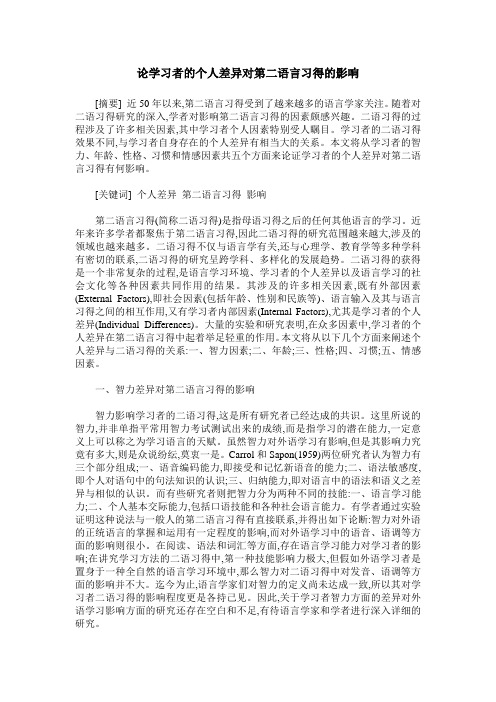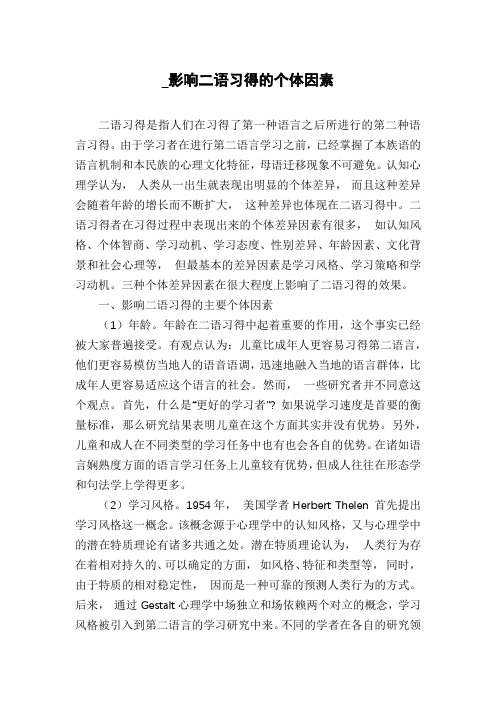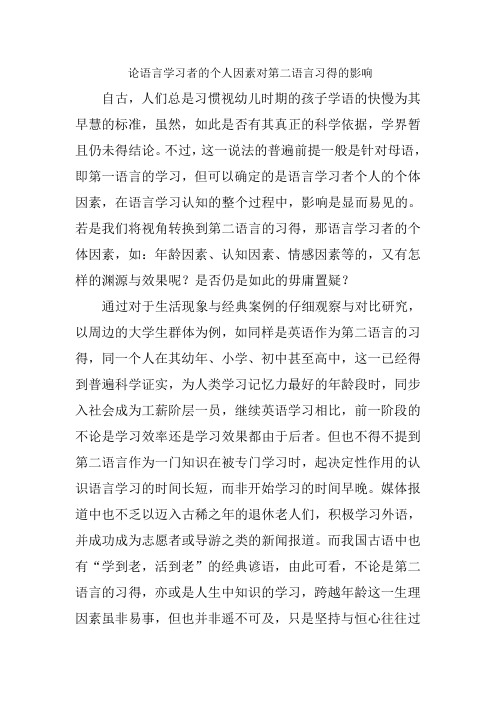二语习得与个人性格关系
你的人格是学习第二语言的决定因素

你的人格是学习第二语言的决定因素语言学家Aneta Pavlenko曾经询问1039位外语使用者:“当你们使用不同的语言时,是不是感到自己好像成为了不一样的人?”65%的人作出了肯定的回答。
此外,也有许多研究证实:使用外语确实会产生一些奇妙的心理作用。
外语如何改变了你?如何用心理学帮你学好第二语言呢?一、使用第二语言时,人们更理性,也更冷酷在心理咨询中,不少来访都会提到自己这样一种感受:当面对母语和自己不一样的咨询师时,有些来访在咨询过程中使用第二语言(如英语)进行讲述。
他们发现,使用第二语言时,他们反而能够更容易地谈起一些难以启齿的事。
他们能更平静地分析自己,尤其是自己的负面和问题。
当他们在用第二语言谈论自己时,仿佛与自己之间拉开了一个距离——这段距离给了理性以存在的空间。
首先,心理学家研究发现:说外语时,我们的道德感会减弱,用外语表达一些“不道德”的事,比母语环境中容易地多。
例如,面对同一个道德困境,人们使用外语时作出的反应,与用母语时并不相同。
这也是人们更容易用第二语言进行困难的谈话的原因。
当我们用母语讲述自己的痛苦时,我们感受到的情绪是鲜活的,羞耻、内疚、悲伤、愤怒等所有情绪都会被母语瞬间激活、淋漓尽致。
这是因为我们在童年阶段(也就是学习、使用母语的时期)学会情绪反应的。
但人们往往在年纪更大时才接触外语。
因此母语和情绪反应的绑定会更深。
此外,有种理论认为,当我们做道德判断时,会涉及到两种独立的、互相竞争的思维模式——一种是感情系统,帮助我们迅速地、直觉般地做出选择;而另一种是认知系统,它的运作速度较为缓慢,同时会认真地衡量不同选择的好处。
而用外语思考时,由于需要费力地组织语句、寻找词汇,促使我们更多地使用认知系统,减少了下意识的情绪反应。
二、学习第二语言,能让人更好地应对不确定性研究发现,学习第二语言,能提高人们“对不确定的承受能力”。
“对不确定的承受能力”指的是“面对未知时,人们的舒适程度”。
论学习者的个人差异对第二语言习得的影响

论学习者的个人差异对第二语言习得的影响[摘要] 近50年以来,第二语言习得受到了越来越多的语言学家关注。
随着对二语习得研究的深入,学者对影响第二语言习得的因素颇感兴趣。
二语习得的过程涉及了许多相关因素,其中学习者个人因素特别受人瞩目。
学习者的二语习得效果不同,与学习者自身存在的个人差异有相当大的关系。
本文将从学习者的智力、年龄、性格、习惯和情感因素共五个方面来论证学习者的个人差异对第二语言习得有何影响。
[关键词] 个人差异第二语言习得影响第二语言习得(简称二语习得)是指母语习得之后的任何其他语言的学习。
近年来许多学者都聚焦于第二语言习得,因此二语习得的研究范围越来越大,涉及的领域也越来越多。
二语习得不仅与语言学有关,还与心理学、教育学等多种学科有密切的联系,二语习得的研究呈跨学科、多样化的发展趋势。
二语习得的获得是一个非常复杂的过程,是语言学习环境、学习者的个人差异以及语言学习的社会文化等各种因素共同作用的结果。
其涉及的许多相关因素,既有外部因素(External Factors),即社会因素(包括年龄、性别和民族等)、语言输入及其与语言习得之间的相互作用,又有学习者内部因素(Internal Factors),尤其是学习者的个人差异(Individual Differences)。
大量的实验和研究表明,在众多因素中,学习者的个人差异在第二语言习得中起着举足轻重的作用。
本文将从以下几个方面来阐述个人差异与二语习得的关系:一、智力因素;二、年龄;三、性格;四、习惯;五、情感因素。
一、智力差异对第二语言习得的影响智力影响学习者的二语习得,这是所有研究者已经达成的共识。
这里所说的智力,并非单指平常用智力考试测试出来的成绩,而是指学习的潜在能力,一定意义上可以称之为学习语言的天赋。
虽然智力对外语学习有影响,但是其影响力究竟有多大,则是众说纷纭,莫衷一是。
Carrol和Sapon(1959)两位研究者认为智力有三个部分组成;一、语音编码能力,即接受和记忆新语音的能力;二、语法敏感度,即个人对语句中的句法知识的认识;三、归纳能力,即对语言中的语法和语义之差异与相似的认识。
浅谈学习第二语言的心理因素

浅谈学习第二语言的心理因素学习第二语言是许多人都感兴趣的话题。
随着全球化的发展,学习第二语言的需求也越来越大。
学习第二语言并非易事,除了语法、词汇等方面的知识外,心理因素也是影响学习效果的重要因素之一。
本文将从心理因素的角度,浅谈学习第二语言的相关问题。
学习第二语言的心理因素包括学习动机、学习焦虑、语言自信心等方面。
学习动机是学习第二语言的重要驱动力之一。
一个人如果缺乏学习动机,很难持之以恒地学习一门语言。
而学习焦虑则是另一个影响学习效果的因素。
许多学习者在学习第二语言的过程中会感到焦虑和紧张,尤其是在面对口语交流的时候。
语言自信心也是学习者能否流利地运用第二语言的重要因素。
如果一个人缺乏语言自信心,就很难克服学习第二语言时遇到的困难。
学习第二语言的环境因素也会影响学习者的心理状态。
在学校、家庭或社会中,学习者所处的环境和氛围会对学习第二语言产生积极或消极的影响。
如果一个学生所在的学校重视第二语言的教学,提供了良好的学习资源和环境,学习者就会感到更有动力和信心去学习。
相反,如果学习者所在的环境对第二语言的重视程度不高,或者学习资源匮乏,学习者就会感到学习的压力和困难。
学习者的个人特点和心理修养也会影响学习第二语言的效果。
一个性格开朗、善于交流的学习者在学习口语时可能会更加得心应手,而一个内向、腼腆的学习者可能就需要更多的鼓励和支持。
学习者的自控能力和抗压能力也会对学习第二语言产生影响。
如果一个学习者有较强的自控能力和抗压能力,就会更容易在学习第二语言时掌握好节奏,保持耐心和信心。
即便面临这些心理因素的影响,学习者依然可以通过一些方法来克服。
学习者可以通过树立目标和规划学习计划来提高学习动机。
一个学习者如果能够清晰地明确自己学习第二语言的目标,然后制定具体的学习计划,并且严格执行,就可以在学习过程中保持积极的学习动力。
学习者可以通过放松和舒缓的方式来缓解学习焦虑。
通过听歌、看电影、阅读等方式来慢慢适应第二语言的语音、语调和文化背景,让学习者愉快地投入到学习中去。
第二语言习得个体差异

第二语言习得的个体差异众所周知众所周知,,一个发育正常的婴幼儿一个发育正常的婴幼儿,,其母语习得的成功率可以达到百分之百到百分之百,,他们从咿呀呀学语到比较完整地表达意愿和进行交际仅需6-7年时间年时间,,而且过程轻松、偷快。
第二语言习得的效果却不尽然尽然,,其过程不仅漫长而且困难重重其过程不仅漫长而且困难重重,,成功率也往往低于第一语言习得。
特别值得注意的是习得。
特别值得注意的是,,使用同一教材使用同一教材,,由同一教师执教由同一教师执教,,运用同样的教学方法和处于同样的环境样的教学方法和处于同样的环境,,学习者的最终学习效果往往会表现出很大的个体差异。
这是为什么呢现出很大的个体差异。
这是为什么呢? ?根据目前的研究根据目前的研究,,影响第二语言习得的因素是多种多样的影响第二语言习得的因素是多种多样的,,大致可分为内部因素和外部因素两大类。
内部因素一般指学习者自身的因素因素,,如学习者的学习态度、学习动机、智力水平如学习者的学习态度、学习动机、智力水平,,语言学能、性格及学习策略等。
外部因素指那些不以习者个人意志为转移的因素及学习策略等。
外部因素指那些不以习者个人意志为转移的因素,,如年龄因素、社会环境因素、家庭因素及性别因素等。
本文将着重讨论影响语言学习的一些内部因素讨论影响语言学习的一些内部因素,,因为某些内部因素是随外界环境的变化而变化的境的变化而变化的,,因而教师可以对他们进行调控因而教师可以对他们进行调控,,并经过使其朝着有利于语言学习的方面转变。
着有利于语言学习的方面转变。
一、态度和动机一、态度和动机(attitude and miti-vation) (attitude and miti-vation)态度和动机被认为是决定第二语言学习成败的最重要的情感因素。
态度一般包括三个内涵素。
态度一般包括三个内涵::对第二语言社团及其成员所持的态度对第二语言社团及其成员所持的态度,,对所学语言的态度及对语言学习一般性的态度。
_影响二语习得的个体因素

_影响二语习得的个体因素二语习得是指人们在习得了第一种语言之后所进行的第二种语言习得。
由于学习者在进行第二语言学习之前,已经掌握了本族语的语言机制和本民族的心理文化特征,母语迁移现象不可避免。
认知心理学认为,人类从一出生就表现出明显的个体差异,而且这种差异会随着年龄的增长而不断扩大,这种差异也体现在二语习得中。
二语习得者在习得过程中表现出来的个体差异因素有很多,如认知风格、个体智商、学习动机、学习态度、性别差异、年龄因素、文化背景和社会心理等,但最基本的差异因素是学习风格、学习策略和学习动机。
三种个体差异因素在很大程度上影响了二语习得的效果。
一、影响二语习得的主要个体因素(1)年龄。
年龄在二语习得中起着重要的作用,这个事实已经被大家普遍接受。
有观点认为:儿童比成年人更容易习得第二语言,他们更容易模仿当地人的语音语调,迅速地融入当地的语言群体,比成年人更容易适应这个语言的社会。
然而,一些研究者并不同意这个观点。
首先,什么是“更好的学习者”? 如果说学习速度是首要的衡量标准,那么研究结果表明儿童在这个方面其实并没有优势。
另外,儿童和成人在不同类型的学习任务中也有也会各自的优势。
在诸如语言娴熟度方面的语言学习任务上儿童较有优势,但成人往往在形态学和句法学上学得更多。
(2)学习风格。
1954年,美国学者Herbert Thelen 首先提出学习风格这一概念。
该概念源于心理学中的认知风格,又与心理学中的潜在特质理论有诸多共通之处。
潜在特质理论认为,人类行为存在着相对持久的、可以确定的方面,如风格、特征和类型等,同时,由于特质的相对稳定性,因而是一种可靠的预测人类行为的方式。
后来,通过Gestalt心理学中场独立和场依赖两个对立的概念,学习风格被引入到第二语言的学习研究中来。
不同的学者在各自的研究领域和理论框架下,都试图给出一个完整的定义,每一个习得者个体也会体现认知风格上的差异,如场独立和场依赖、分析与综合、冲动与思考、具体顺序学习和抽象随机学习之间的差异与对立等。
论语言学习者的个体因素对第二语言习得的影响

论语言学习者的个人因素对第二语言习得的影响自古,人们总是习惯视幼儿时期的孩子学语的快慢为其早慧的标准,虽然,如此是否有其真正的科学依据,学界暂且仍未得结论。
不过,这一说法的普遍前提一般是针对母语,即第一语言的学习,但可以确定的是语言学习者个人的个体因素,在语言学习认知的整个过程中,影响是显而易见的。
若是我们将视角转换到第二语言的习得,那语言学习者的个体因素,如:年龄因素、认知因素、情感因素等的,又有怎样的渊源与效果呢?是否仍是如此的毋庸置疑?通过对于生活现象与经典案例的仔细观察与对比研究,以周边的大学生群体为例,如同样是英语作为第二语言的习得,同一个人在其幼年、小学、初中甚至高中,这一已经得到普遍科学证实,为人类学习记忆力最好的年龄段时,同步入社会成为工薪阶层一员,继续英语学习相比,前一阶段的不论是学习效率还是学习效果都由于后者。
但也不得不提到第二语言作为一门知识在被专门学习时,起决定性作用的认识语言学习的时间长短,而非开始学习的时间早晚。
媒体报道中也不乏以迈入古稀之年的退休老人们,积极学习外语,并成功成为志愿者或导游之类的新闻报道。
而我国古语中也有“学到老,活到老”的经典谚语,由此可看,不论是第二语言的习得,亦或是人生中知识的学习,跨越年龄这一生理因素虽非易事,但也并非遥不可及,只是坚持与恒心往往过于珍贵。
生活中,人们总是简单地称容易做错事或者知识学习能力较低较慢的人为智力不足或低下者。
殊不知,所谓智力,在学界的科学定义是指,人的一种心理机能,是成功地认识客观事物和解决问题耳朵各种心理因素的总和,是由观察力、注意力、记忆力、思维能力、想象能力、创造能力组成的综合能力。
另外,语言习得中若是谈及智力一说,不得不联系的考虑到“认知因素”一词,而具体分析,即在学习者的智力机能、语言学能、学习策略和交际策略、认知方式共同作用效果下,影响语言学习的效率。
以此看来,就第二语言的习得而言,受他人评价智力高低一说及自身学习过程原有困难程度的影响,学习者的个人自信会受明显限制,进而长期潜行的影响语言习得。
二语习得个性差异探析
二语习得个性差异探析一、前言目前,从事第二语言习得研究的专家学者涉及语言发展过程中的记忆和认知过程、注意和形式识别的学习过程,但很少涉及心理学的起源。
此外,从认知心理学的角度对二语习得中人格差异的研究还很少。
原因在于,不同理论视角的专家学者对如何理解第二语言发展中的人格差异有不同的假设。
本文提出的解决办法要求清楚地认识个人认知策略中复杂的感知、记忆、注意力等需要。
从理解基本语言单位到应对交流沟通都可以感受到这种需要。
二、个体学习者差异学习者的差别分为七个方面:年龄、资质、动机、学习方法、态度、情感状态、性格。
1.年龄二语习得中的一个最显著的现象是人们开始学的年龄越小,学习就会越成功。
首先,理解和分解声音的能力会随着年龄的增长而削弱。
其次,在人类成长的关键期之后,神经上的可塑性会降低,这会抑制获得一些新语言技能的某些方面的能力,如语音、语法等。
再次,学习者的年龄越大,与以另一种语言作为母语的人交流,以及要融入他们的社会的动机越不强烈,用二语交流时,学习者年龄越大,自我意识越强,焦虑程度越大。
第四,学习者的年龄越大,尤其在成年阶段,就越容易使用不同的、效率低的学习原理。
第五,相对于成年人来说,年纪小的学习者更容易得到以语言学习为目的的语言输入。
最后,年纪大的学习者已经拥有了高度发展的第一语言系统,那么他就需要用与年轻学习者不同的方式来协调两种语言的记忆存储,而年轻学习者的两种语言的记忆存储是同时进行的。
2.资格语言学习资质是另一个常常用来解释个体之间差异的学习者特性。
skehan(1991)指出语言资质的概念有如下含义:(1)存在独立于智力的语言学习天分;(2)这种天分不只是语言学习经历的产物;(3)这种天分在每个人的一生中相对稳定;(4)这种天分人人不同。
很明显,如果这种资质或天分的确存在,那么其对于语言学习有实践意义和理论指导意义。
Carroll(1981)认为语言资格包括四种能力:音素编码能力、语法意识、归纳语言学习能力和机械学习能力。
学习者个体差异对二语习得的影响_毕业论文提纲
学习者个体差异对二语习得的影响_毕业论文提纲论文导读::本文主要分析学习者个体差异中年龄、动机、语言学习能力、认知风格、性格等五个最主要的因素与而与习得的关系,从而为如何根据个体差异来采用学习策略,提高学习效果,促进二语习得做个参考依据。
论文关键词:个体差异,二语习得一、引言自上世纪50年代以来,学习者个体差异在二语习得中的作用一直被广泛关注毕业论文提纲,学习者个体差异研究也已成为二语习得研究中的主线之一。
按照众多学者的共识,这些个体差异因素包括以下几个方面:1)对如何学习外语所持的看法和观点;2)精神和心理状态;3)年龄因素;4)学习动机;5)语言能力倾向;6)认知风格7)性格因素。
本文主要探讨的时后四项个体差异因素对二语习得的影响。
二、动机因素对二语习得的影响动机指的是那些能引起、维持一个人的活动,并将该活动导向某一目标,以满足个体某种需要的念头、愿望、理想等因素免费论文下载。
其可分如下类型:1.内在激励,它指外语学习者从学习本身所获得的满足。
教师和学生保持和谐的关系是维持学生兴趣的关键。
2.结果动机毕业论文提纲,是指外语学习者由于取得好的学习成绩,产生成就感而获得的满足。
动机与学习成绩是相辅相成。
3.综合动机,指的是由于外语学习者对其所学语言为母语的民族及其文化等怀有一种浓厚的兴趣二学期语言,以达到与其交往,甚至融于该社会文化之中的目的。
4.工具性动机毕业论文提纲,是外语学习者对外语本身并无兴趣或没有与讲母语的人进行焦急的条件,学习外语知识作为达到其他目的的手段或工具,如找工作,读原文报刊或通过考试等等,这样的动机成为工具性动机。
三、语言学习能力对二语习得的影响语言能力倾向指外语学习者所具备的一种自然的语言学习能力毕业论文提纲,即它是一种可能发展出来的潜在能力。
一般认为语言能力倾向主要体现在四个方面免费论文下载。
1.语言解码能力,即具有辨别、记忆所学外语音素的能力。
2.语法解码能力,有的学者亦称其为语法敏感性,这主要指学习者具有辨别句子中各个词所具有的语法功能的能力。
浅析影响二语习得的因素
浅析影响二语习得的因素作者:李微来源:《大观》2015年第06期摘要:第二语言的习得是非常复杂的过程。
语言习得的过程被许多因素所影响,其中包括了学习者的动机和态度等。
而在整个过程中,这些因素之间也相互影响,相互制约,同时产生了不少的变量。
学习者之间这些因素的差异直接影响了其学习成果的差异。
因此,研究影响二语习得的因素,有助于教师更好地了解学习者,从而激发和培养学习者的学习兴趣。
关键词:二语习得;影响因素;学习者第二语言习得(Second Language Acquisition /SLA,简称二语习得),通常指母语习得之后的任何其他语言学习。
人们从社会、心理、语言学等角度去研究它。
第二语言习得研究作为一个独立学科,大概形成于二十世纪60年代末70年代初,已有35年的历史。
它对学习者的第二语言特征及其发展变化、学习者学习第二外语时所具有的共同特征和个别差异进行描写,并分析影响二语习得的内外部因素。
一、影响二语习得的因素(一)年龄人们通常认为年纪越小的外语学习者越容易达到接近本族语者的语言水平,而且这个观点也被临界期假设(Critical Period Hypothesis)所证明。
此假设认为在人类生命中的一段时期里,语言的习得是自然发生并无需通过努力的,过了这段时期以后,语言的学习再也无法达到之前所述的效果。
这一假设建立在神经生理研究的基础上。
青春期之前的儿童期大脑左半球的语言区如因意外事故受到损害,还会从左脑转移到右脑,恢复语言功能。
到了青春期,人的大脑语言的侧向已经完成,固定在大脑的左侧,语言功能一旦丧失很难恢复。
临界期假设对外语学习做了两个预测,一是必须赶在大脑语言功能的侧向完成之前学习口语;二是过了临界期,语言学习的速度减缓,学习的成效减弱。
Penfield和Roberts(1959)甚至认为语言习得的最佳时间是0岁-10岁之间。
尽管有关理论后续的研究,尤其是学习语言的确切的最佳年龄一直被一些语言学家怀疑,年龄对外语学习的重要影响毋庸置疑。
浅析学习动机与性格对二语习得者的影响
浅析学习动机与性格对二语习得者的影响作者:陈妍来源:《速读·上旬》2017年第10期摘要:在第二语言习得过程中,个人差异对学习者的影响很大。
个人差异因素中,学习动机与性格又在相互影响。
此外,这两个因素与学习者的学习结果之间也在相互作用。
关键词:二语习得;学习动机;性格二语习得过程中,我们普遍关注的问题在于为什么有些二语习得者会比其他人学的更好?从心理学的角度看,个体差异(individual difference)在二语习得的过程中占有重要位置。
其中学习动机与性格已被发现是影响习得结果的因素。
并且这些因素之间不是孤立的、单独的作用于学习者,而是综合的、相互交错的在影响,并且因素与因素之间还存在着相互影响。
一、学习动机对二语习得结果的影响学习动机指的是学习活动的推动力,又称“学习的动力”。
它不是单一的结构,动机会决定努力程度,常常是决定二语习得程度的关键。
学生的学习活动是由各种不同的动力因素组成的整个系统所引起的。
其中,动机包括:重要的目标或需求;达到目标的欲望;学习观念;信念;对潜在回报的重视。
(Oxford and Ehrman 1993;Dornyei 2001)Gardner和Lambert将动机分为两种:融入型动机和工具型动机。
融入型动机指学习者喜欢并欣赏所学语言,对所学语言社团有特殊兴趣,期望参与或融入该团的社会生活并为目标与社团所接受;工具型动机指学习者将目标语看作是一种工具,为了某一特殊目的,如通过某一考试,获得某一职位等。
当问到学习动机与二语习得结果孰先孰后时,我们不禁要思考一下衡量二语习得者成功的标准是什么?是就某一次考试的成绩,还是与同期同学段的学习者相比较?以同学段为参照标准,是横向比较。
从纵向看,学习一门语言并不是某一个时期学的好就以此来判断最终结果。
第二语言语言习得的过程是一个终生学习的过程,纵观二语习得者一生的习得结果,更能全面的说明他是否是一个成功的二语习得者。
- 1、下载文档前请自行甄别文档内容的完整性,平台不提供额外的编辑、内容补充、找答案等附加服务。
- 2、"仅部分预览"的文档,不可在线预览部分如存在完整性等问题,可反馈申请退款(可完整预览的文档不适用该条件!)。
- 3、如文档侵犯您的权益,请联系客服反馈,我们会尽快为您处理(人工客服工作时间:9:00-18:30)。
J I A N G S U U N I V E R S I T Y 课程期末论文Affective Factors and Second LanguageAcquisition课程名称:二语习得理论与应用学院名称:外国语学院专业班级:英语(师范)1202姓名学号:陈彦君 31217020422014年12月Affective Factors and Second Language Acquisition Abstract:This paper is brought into four parts, the four affective factors: motivation, self-esteem, anxiety and empathy, which relate to each other closely, each one can not depart the others to exist independently. When facing a new language, not everyone has interest, if he has interest he may have confidence, motivation or anxiety or may not. If self- confidence is enhanced, motivation maybe more intense, anxiety may be reduced; if anxiety is reduced, confidence may be higher, motivation may be consolidated. For the teachers and students, empathy is embodied in every aspect of teaching.Keywords: Second Language, Affective Factors, Teaching, AnxietyInstructionThe definition of second language acquisition is the process by which people learn a second language. Second-language acquisition (often abbreviated to SLA) also refers to the scientific discipline devoted to studying that process. Second language refers to any language learned in addition to a person's first language. Although the concept is named second-language acquisition, it can also incorporate the learning of third, fourth, or subsequent languages. Second-language acquisition refers to what learners do. It does not refer to practices in language teaching, although teaching can affect acquisition.The development of second language acquisition in emotional domainIn the early stages, that is the common sense of academic circle that second language acquisition is susceptible by emotional factors in the learning process. The pioneers who made a great contribution in this field are Stephen D. Krashen, Rod Ellis and H.H.Sten. According to the research achievement of psychology and sociology, Krashen put forward the Affective Filter Hypotheses which combines the studies of emotion into his famous work Five Hypothesis Theory. And in Fundamental Concepts of Language Teaching made by Stern in 1983, he gave an idea that a positive correlation between learner’s attitude about the target language and learning outcomes. In other words, it is important to also notice the affective factors just like cognitive factors to second language acquisition.Since 1990s, with the broadening of the research situation, research direction and research space, more and more scholars began to pay more attention to affective factors. Ellis published the second book about SLA The Study of Second Language Acquisition which further articulates the differences between personal emotions, physiology and constructs. He thought that changeability and individuality of effective states lead to could not to have a systematic study in affective factors. Ellis made a comprehensive induction of study motivation. His new ideas about resultativemotivation, motivation as intrinsic interest and machiavellian motivation are based on the Instrumental & Integrative Motivation published by Gardner and Lambert in 1972. That is to say, learners who make higher scores in assessment for cognitions, emotions and general satisfaction have the stronger motivation.In the late nineties, Affect in Language Learning worked by J.Arnold and H. Arnold discussed that the influence of affective factors on second language acquisition. Research shows that In foreign and second language classroom, the success of the learning activity is dependent on strong and vital connections between learners and teacher, as well as among learner themselves. Humanistic acknowledge and emotional teaching plays an significant role in class, making students to have a positive impact on attitude of target language.Besides that, in this period of study, There are other scholars concentrated on the influence of the emotional factors in language acquisition in different ways. Oxford said that if students do not have enough exercise, the development of second language will be strained by comparison between classmates or their ideal self-image.All in all, throughout the 1990s, the research of affective factors in the study of SLA has rich achievement .Also, due to the restriction by various factors and conditions, the study of emotional factors need further exploration. I believe that emotional research in second language acquisition will have a great promotion and development because of more attention of the society in the near future.Definition and Categories of Affective FactorsWe must have a clear idea of affective factors before studying on the relationship between the emotional factors and language learning. The word affect is the root of such words as affection, our feelings for those people who are particular special in our lives and it has been part of the language of emotion for a long time. As usually defined, affect refers to the simple pleasant or unpleasant tone of a feeling. And it does typically not involve complex cognitive activity. The author uses the terms affect, emotions and feelings almost interchangeability, without explicitly distinctive definitions. The development of affective states involves a variety of factors, feelings both about us and about others with whom we come into contact.There are so many affective factors influence the English teaching, such as motivation, self-confidence and anxiety, Krashen calls them ‘the affective filter factors’. But in the practical English teaching, there are some other factors influence the English teaching, including attitude, inhibition, self-esteem, extroversion and introversion, empathy, classroom transactions and cross-cultural processes and so on. The following will show the four main factors of them which affect the foreign language teaching.1.MotivationMotivation, in more technical terms, refers to ‘the choices people make as to what experiences or goals they will approach or avoid, and the degree of effect they will exert in that respect.’On one hand, motivation is a crucial force that determines learners to do their works, how much energy they dedicate to it, and how long theypersevere. On the other hand, it is just a thought as inner drive and emotion that moves one to meet their own goals. For the second language learner, their learning motivation is certain needs and drives of learning a foreign language.2.EmpathyIn second language acquisition fields, empathy has two kinds of meanings. First, teachers put their student‟s affection in their mind in order to better understand them. Second, students need to keep up with teacher‟s thoughts, comprehend what are teaching purposes or aims, and adapt to teacher‟s teaching method. It will discuss the positive and negative effects of empathy on second language acquisition from this two means3.extroversion and introversionExtroversion and introversion are also potentially important impacts on second language acquisition. The extroverted person is outgoing and more sociable than introverts. Conversely, introverted people are just shy and quiet. Such views of extroversion and introversion are misleading, and it is stereotyped points. According to Brown, ‘extroversion is the extent to which a person has a deep-seated need to receive ego enhancement, self-esteem, and a sense of wholeness from other people as opposed to receiving that affirmation within oneself…Introversion, on the other hand, is the extent to which a person derives senses of wholeness and fulfillment apart from a reflection of this self from other people.’Man‟s personality decides his behavior, attitude, and the way of thinking from the inner. In other words, the impact of learner‟s character is an essential factor for their learning activities. Meanwhile, it is one of the main causes of individual difference among learners. So, what is the relationship between personality and second language acquisition at all? The next parts will talk about their relation.4.Self-esteemSelf-esteem is probably the most universal aspect of human behavior. According to Coopersmith, ‘By self-esteem, we refer to the evaluation which the individual makes customarily maintains with regard to himself; it expresses an attitude of a approval or disapproval, and indicates the extent to which and individual believes himself to be capable, significant, successful and worthy. In short, self-esteem is a personal judgment of worthiness that is expressed in the attitudes that the individual holds towards himself.’ That means self-esteem is knowledge of yourself and belief in your own ability. Learner‟s self-esteem comes from the accumulation of language learning experiences and the evaluation from the outside of their performance and achievement in learning processResearch MethodsThis article has designed a questionnaire including motivation, empathy,extroversion and introversion and self-esteem. Because of time limited, I just get 25 questionnaires from my classmates. Their data were collected for statistic analysis, among which 18were females, 7 were males and the age ranged from 19 to 21 with the average being 20 years old. There are two parts in the examination paper: multi-choice and essay questions.Results and AnalysisAccording to the data I collected, a phenomena has been found that most of learners’motives are to get a high mark and hunt a good job. There are few learners to learn second language because of their interest. Pass the examinations and find a good job are the main reasons for them to learn second language.Learners could not learn second language well due to anxiety make up the majority of students. They want to learn the second language well, but they do not know how to improve their language levels and are afraid of making mistakes. Learners who experience intense anxiety often lose heart.Though exact anxiety can help the learners in language learning, anxiety indeed makes learners nervous and afraid and thus contributes to poor performance; this, in turn, creates more anxiety and even worse performance. Consistent negative correlations have been found between foreign language anxiety and various measures of foreign language achievement. Much of the anxiety is associated with understanding and speaking the foreign language. Speaking publicly in the target language has been found to be particularly anxiety provoking for many learners, even those who feel little stress in other aspects of language learning. With respect to understanding the foreign language, some learners report an indecipherable buzz whenever they are asked to listen to the foreign language. Most language researches show a negative relationship between anxiety and performance. The negative kind of anxiety is sometimes called …debilitating anxiety‟, because it harms learners‟performance in many ways, both indirectly through worry and self-doubt and directly by reducing participation and creating overt avoidance of the language. Harmful anxiety can be related to plummeting motivation, negative attitudes and beliefs, and language performance difficulties.ConclusionThis paper is brought into four parts, the four affective factors: motivation, self-esteem, anxiety and empathy, which relate to each other closely, each one can not depart the others to exist independently. When facing a new language, not everyone has interest, if he has interest he may have confidence, motivation or anxiety or may not. If self- confidence is enhanced, motivation maybe more intense, anxiety may be reduced; if anxiety is reduced, confidence may be higher, motivation may be consolidated. For the teachers and students, empathy is embodied in every aspect of teaching.All above four affective factors illustrate their influence to the English teaching and the solution from the perspective of motivation, self-confidence, anxiety and empathy, the writer does not analysis it very deeply and comprehensively, in fact they are some other affective factors influence the foreign language teaching, such as inhibition, introversion/extroversion, classroom transactions and so on. Because Krashenadvanced the theory of ‘affective filter hypothesis’, some researchers set about studying it, but this is only a simple analysis on the basis of theory and practice, the affective factors are not carried out much in teaching or are not carried out at all , so this is one of directions for the teachers to develop.Reference1.Gass & Selinker 2008, p. 72.Erton, I. (2010). Relations between personality traits, language learning styles and success in foreign language achievement.Hacettepe University Journal of Education,38, 155–126.3.Dulay,Burt&Krashen,19824.Alastair Sharp:Personality and Second Language Learning, 2008.115.Analysis of Affective Factors in Senior Students6.An Analysis of Affective Factors’ Influences。
